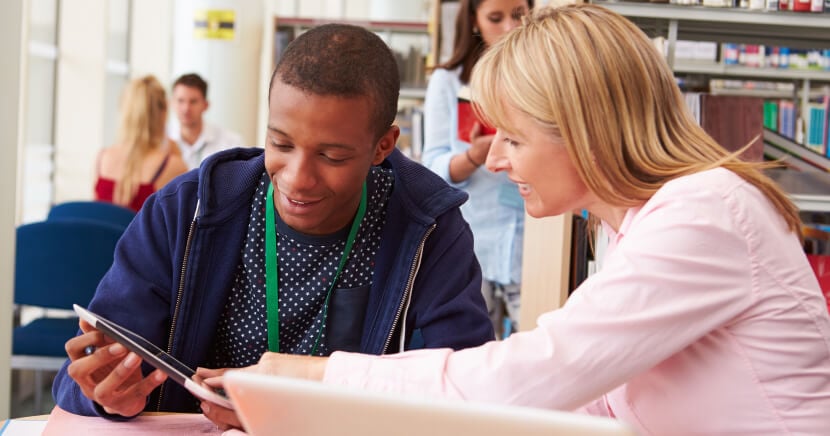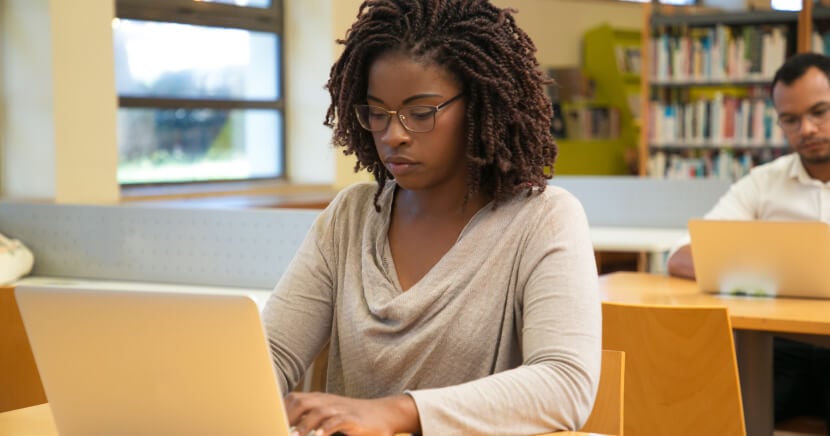University and college libraries are evolving rapidly to meet the changing needs of students, faculty and researchers. With the start of a new academic year fast approaching, it's a good time to take a look at a few current academic library trends and statistics:
See also:
-
Academic librarians help students succeed, but student engagement is key
-
Faced with budget cuts, academic libraries must get creative with resources
Digital transformation in academic libraries
Like public libraries, academic libraries are constantly expanding their digital collections, incorporating eBooks, journals and multimedia resources, including digital news platforms such as PressReader.
The Association of College and Research Libraries (ACRL) Academic Library Trends and Statistics Survey reports that, between 2017 and 2022 (the most recent year for which numbers are available), the average number of digital/electronic book titles in library collections changed from 315,213 to 619,805, an increase of 96.6%.
Along with an expansion of digital services, this shift supports remote learning and research.
There is a growing emphasis on open access to research publications, making scholarly work freely available online. Libraries often support open access publishing and repositories.
Open Educational Resources (OER)
Academic libraries are playing a key role in the adoption and creation of Open Educational Resources (OER), which are freely accessible teaching and learning materials. This trend is driven by the numerous challenges raised by reduced institutional budgets as well as the need to lower textbook costs for students and provide flexible, customizable resources for instructors.
Many libraries provide support for faculty in finding, using, and creating OER, including offering grants or incentives to develop open course materials.
Data management and research support
Libraries are increasingly offering data management support, helping researchers store, organize and share their data. This includes guidance on data preservation, data curation and compliance with funder requirements.
Some libraries have established centers focused on digital scholarship, providing tools and expertise for data analysis, visualization and digital humanities projects.
Learning spaces and technology integration
Academic libraries can play a role in supporting collaborative learning by providing resources, spaces and services that facilitate student collaboration and small-group activities.
Here are several ways academic libraries can enhance collaborative learning:
Flexible learning spaces
-
Group study rooms: Equipped with whiteboards, monitors and collaborative technologies, these rooms allow students to work together on projects or study sessions without disturbing others.
-
Open and flexible seating areas: Configurable seating arrangements that accommodate group discussions and collaborative work.
-
Media production studios: Spaces where students can collaborate on multimedia projects, such as video production or podcast creation..
Technology and tools
-
Collaborative software and platforms: Providing access to tools like Google Workspace, Microsoft Teams or Slack for group work and communication.
-
Loanable technology: Offering equipment such as laptops, tablets, cameras and audio recording devices that students can use for collaborative learning experiences.
-
Interactive displays and smart boards: Facilitating group discussions and presentations with advanced technology.
Social responsibility and DEI
Being a global citizen means recognizing that one's identity and responsibilities extend beyond national borders, and that one is part of a global community with shared values and challenges.
The academic library can help its users cultivate this mindset by offering workshops on how to find, evaluate and use information from a global perspective.
Creating research guides that focus on global issues can help students understand and engage with topics like climate change, human rights and international politics. Libraries that offer PressReader can make these resources accessible on students' own devices by uploading them to the platform using the Self-Pub feature.
Libraries are committed to enhancing diversity, equity and inclusion (DEI) in their services through their hiring practices, and by building collections that represent diverse perspectives. Library staff strive to ensure that all community members feel welcome and supported.
Information literacy and critical thinking

According to the ACRL, information literacy is "the set of integrated abilities encompassing the reflective discovery of information, the understanding of how information is produced and valued, and the use of information in creating new knowledge and participating ethically in communities of learning."
Much like media literacy and digital literacy, information literacy empowers people to learn for themselves so that they can make more informed decisions. It helps them recognize biases, understand context and evaluate information so they can effectively use and communicate it.
It’s a lifelong skill set that meaningfully impacts every person’s education, career path, civic involvement and personal life.
In the context of postsecondary education, the academic library can provide instruction in information literacy to students, helping them develop the skills they need to find and evaluate information effectively. This can include workshops, online tutorials or one-on-one consultations.
Health and well-being initiatives
As we explored in a previous blog post, the academic journey can be a stressful one. According to the Lumina Foundation-Gallup 2024 State of Higher Education Study — based on a web survey of 14,032 current and prospective students — 35% of college students in the United States reported that they had considered leaving their programs in the preceding six months.
The primary reason survey participants give for leaving higher education? Their well-being, with 54% reporting emotional stress and 43% citing mental health reasons.
According to research cited by the Association of College and Research Libraries, "The changes to learning environments and increased social isolation during the COVID-19 pandemic had a mental health impact on current and incoming college students including increased rates of depression and anxiety." In response, many academic libraries have adopted strategies to address student mental health and well-being "that go beyond scholarship to support for the whole student".
For example, libraries might offer mindfulness spaces, provide resources on mental health and organizing stress-relief activities during exams.
Libraries may also foster a sense of community by hosting events, study breaks and other activities that encourage social interaction and support.
AI and machine learning integration
A large number of libraries are beginning to integrate artificial intelligence and machine learning into their services, such as chatbots for reference services, AI-driven search tools for improved discovery and predictive analytics to anticipate user needs.
An AI-powered indexing tool, for example, can automatically assign keywords based on concepts it identifies in a text through content analysis and can help university library users discover new sources of information from different disciplines, allowing them to find more specific and accurate material to support their research.
As they adopt AI technologies, academic librarians are also exploring the ethical implications, ensuring that AI tools are used in ways that are practical, responsible and human-centered.
(For an in-depth look at this topic, please download PressReader's new report on AI in Libraries.)
Digital preservation and archiving

As more scholarly work and primary sources are created in digital formats, libraries are focusing on the long-term preservation of digital content. This includes developing strategies for digital archiving and addressing challenges related to format obsolescence and data integrity.
Libraries are also engaged in preserving cultural heritage materials, particularly those that are at risk of being lost due to conflict, climate change, or neglect. This may include helping to preserve and promote Indigenous languages.
These key trends reflect the dynamic role of academic libraries in supporting research, teaching and learning in a rapidly changing environment. Libraries are not just adapting to new technologies and societal shifts but are often leading the way in creating more accessible, inclusive and sustainable academic communities.









